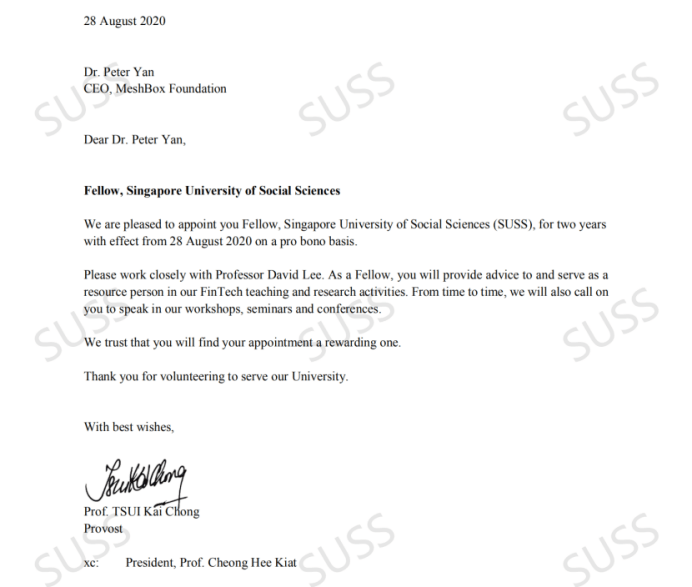Congratulations are in order as MeshBox Foundation’s CEO, Dr. Peter Yan, has become a Fellow of SUSS at Singapore University of Social Sciences. This appointment was made in light of MeshBox’s excellent collaboration with the University this year, and so Professor David Lee kindly made the invitation. The continuous in-depth cooperation between SUSS, SmartMesh and MeshBox will create a solid foundation for Singapore’s blockchain Living Lab to become a global open token ecosystem base.
This week, Dr. Peter led the team to complete the new plan and roadmap of DeFi + NFT + distributed communication + distributed storage. Next week, MeshBox’s official website roadmap will be updated and a new white paper will be released. Also, on Monday evening, the MeshBox Team held an AMA event entitled “DeFi+NFT+Distributed Communication & Storage” in the MeshBox Telegram group with numerous community members stepping up to ask questions.
Here are the specifics of this week:

Software:
software test
updated version:
MeshBox-Maxwell v1.2.5.857
MeshBox-Tesla v2.2.5.858
MeshBox-Turing v3.2.5.859
Optimized temperature sensor reading
Optimized GPS reading
Combine the reset button
Optimized syslog configuration
Optimized temperature reading
Optimize the time zone configuration in the system log
Optimize station dump script
Hardware
Organized and adjusted the prototypes returned from FCC testing, and coordinated the testing by certified laboratory engineers to supplement the EN 60950 report.
Product
Hardware:
Analyzed and tested the GPS function and file sharing function in the local area network of competing products.

The specific work is as follows:
As previously mentioned, MeshBox CEO Peter Yan has been appointed a Fellow at the Singapore University of Social Sciences. Here is the letter of invitation:

- The plan for MeshBox pre-sales featuring a mining pool based on an NFT driven DeFi model have been basically laid out. The MeshBox Foundation will add new mining pools in batches according to market deployment needs. Each mining pool sets its total amount of MESH according to a 3-year liquidity mining reward. The mining cycle of each pool is 3 years, and the user mortgage leverages the stable coins USDT and DAI to enter the mining pool and obtain NFTs. The stablecoins are pledged before mining rewards can be redeemed. When the number of pledges in the mining pool reaches the designated standard amount of pledges then the mining starts, the users of the mining pool will begin to receive MESH income. The stablecoin is not refundable, but can be transferred to obtain liquidity. During this period, if users do not want to continue mining, they can transfer their NFT to other investors according to the discount rate of the number of mining blocks to obtain a corresponding amount of stable coins to withdraw from mining.
The MeshBox boxes, produced by the MeshBox Foundation, will be deployed to Southeast Asian countries such as Singapore, the Philippines, Indonesia, Malaysia, Brunei, Papua New Guinea and other Southeast Asian countries at low cost or even for free to provide valuable Internet access and Internet of Things coverage. Partners will be responsible for providing services. Operators and local users will need to purchase MESH and SMT on an exchange (these will be new exchange users) to exchange for Data Points (DP, stable currency points on the network, and cannot be traded) network.
- The AMA series of activities continued this Thursday. Eric Wong, Chief Operating Officer of ecosystem partner JEDTrade, shared in the community about the latest hot topics including FinTech, DeFi, NFT, supply chain, blockchain, and AI.

The collaborative project between JEDTrade and SmartMesh has received financial support from the Singapore government. In the collaborative scheme, MeshBox is used for inclusive connectivity and distributed storage. Eric believes that this collaboration will provide a strong development platform for DeFi.


